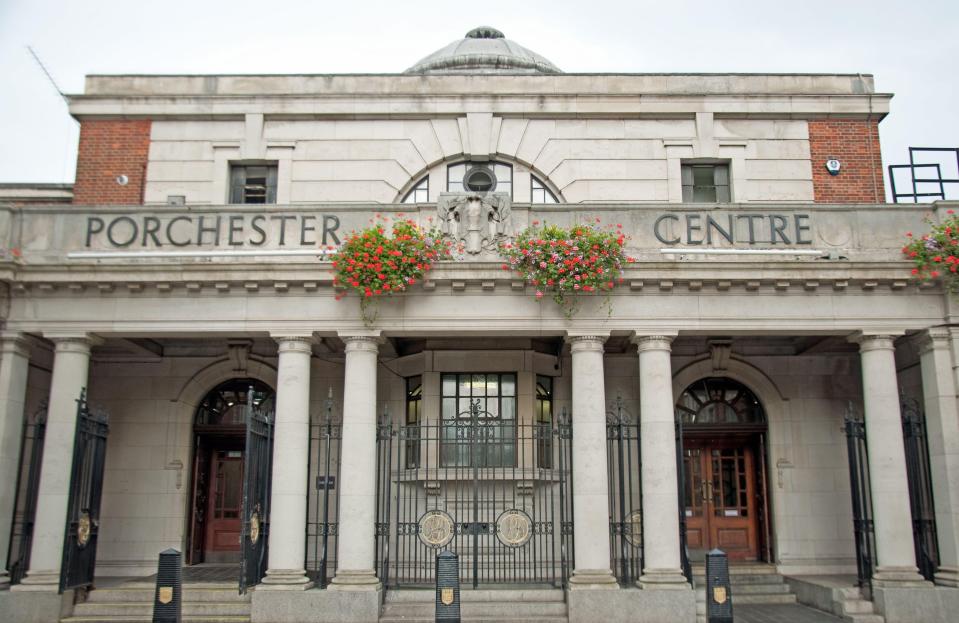Of course Harriet Walter would choose this place, I think, swishing through the revolving door of Arlington in Mayfair into an Art Deco hall of mirrors reflecting monochrome stripes and polished tile. The atmosphere is almost cruelly chic. Where else would a woman famous for her portrayal of stony-hearted, acid-tongued ice queens want to meet?
The waiter takes me to a table in a discreet corner. David Bailey’s black-and-white portraits of 1960s icons look on from every wall. The nearest is of a white-stockinged, kohl-eyed Penelope Tree in 1967, photographed lounging next to an open bottle of champagne, cheekbones like razors. It all makes perfect sense.
So when Walter herself appears, the disorientation is profound. She looks soft — almost fluffy — in a powder-pink herringbone tweed suit and pearl earrings. Her smile is eager and warms up the atmosphere by several degrees. And then there’s her voice. At first she speaks so quietly she sounds almost timorous. It is genuinely hard to believe this is the same person whose sardonic drawl ripped shreds out of her spoiled children in Succession or barked orders as Brutus in a production of Julius Caesar set in a women’s prison. How on earth will she pull off playing Margaret Thatcher in her next TV role, I wonder?
As usual, first impressions are misleading. Over the course of the next couple of hours, in a gradual crescendo, all these characters, and more, will make appearances at our table. Harriet Walter is just warming up.
She’s had plenty of opportunity lately to practise the art of summoning characters she’s played back to life. Her new book She Speaks! is a collection of speeches for Shakespearean women, in which Walter imagines (in blank verse) what Ophelia or Cressida or Desdemona might have said to an audience had they been able to talk frankly instead of being left silent while their fates were decided by the men around them. It’s Walter’s way of redressing the balance of power a bit — and of sharing some of the theories she’s developed in five decades of performing Shakespeare.
Walter sits down opposite me, gesturing to Penelope’s legs. “There’s vintage,” she murmurs. “They were all the people I wanted to look like when I was 17 — and really didn’t.” Born in 1950, Walter was exactly that age when the picture was taken, about to decide that she wanted to become an actor. Since then, hers has been a fantastically varied career, starting with regional theatre, then the Royal Shakespeare Company, the West End and Broadway. She’s done period drama, from Ang Lee’s Sense and Sensibility in 1995 to the 2007 film adaptation of Ian McEwan’s Atonement. She’s had six words in a Star Wars movie and six seasons as Detective Inspector Natalie Chandler in Law & Order: UK. But even so, until relatively recently, her name might elicit only a vague nod of recognition among those outside the theatre world.
For a while, that worked for Walter: “I’ve always wanted to not be known because I thought that left me freer to explore,” she says. But “then that lack of fame started to be a bit of a glass ceiling for me”. In her forties there were parts that eluded her “because I wasn’t enough of a name . . . I remember this producer taking me out and he said, ‘You’re known by everyone in the profession, but no one in this restaurant knows who you are. And I want to change that.”
Did he succeed? “No! But it was a good line! And sucker that I was, I went for it.”
It might have taken a while but things have changed. At 74, a damehood and a run of wildly popular TV parts in Succession, Ted Lasso and Killing Eve, as well as memorable turns in Downton Abbey and The Crown, have made Walter properly recognisable. The clientele of Arlington may be too well-heeled to gawp at celebrities, but it’s pretty obvious that they all know she’s here.
We look at our menus. Walter doesn’t drink at lunchtime except on special occasions. Today she is eating with a journalist at a spot conveniently located around the corner from her next appointment, so she orders a Diet Coke. I, on the other hand, am having lunch with a Dame at the newly reopened and renamed Le Caprice, conveniently located next door to the Ritz, so I order a glass of champagne. It arrives in a very beautiful cone-shaped flute, and seems to last for ever. She asks for gazpacho, and I order the tomato and basil galette, a favourite from Le Caprice’s old menu.
“I’ve not been since it reopened,” Walter says. “I know Jeremy [King, the restaurateur]. He was incredibly kind to my aunt during Covid. She lived near his Colbert restaurant, in Sloane Square. He arranged for her to have food brought out to her — so absolutely divine. I thought it would be nice to come to his new place.”
Menu
Arlington
20 Arlington Street, London SW1A 1RJ
Gazpacho £9.50
Tomato galette £12.25
Grilled calf’s liver £29.75
Chicken Milanese £26
Hokey pokey coupe £10.50
Diet Coke £4.50
Glass Herbert Hall Brut £18
Glass sparkling water £3
Americano £4.75
Double espresso £4.50
Total inc service £141.16
The aunt in question was married to Christopher Lee, the Hammer horror star and brother of Walter’s mother Xandra. Walter has described her family as having lived in the “foothills of aristocracy”, but that feels like something of an understatement. Xandra and Christopher were the children of an Italian countess, Estelle Marie Carandini di Sarzano, and Geoffrey Trollope Lee. On the other side, the Walter family were the founders of The Times newspaper.
Walter grew up in Kensington and was sent to boarding school at 11. It provided what she describes as “a very minimum girls’ education . . . be able to play a nice sonata on the piano and speak good French. And you might marry a nice earl.” Later, she moved to another school, in Dorset, which was better. But it was a long way from London. “I think about how long that journey was and how far we were from home. And the horrible little phone box we’d all queue up to ring our parents from, rather like prison.” Then, after her parents divorced, “I’d only see one of them each term.”
She must have been pretty tough, I suggest, to deal with all that. She looks up a little sharply over her soup spoon. “My sister was there, my best friend was going, I had my teddy bear. You know, I knew my mother loved me. I was good at making friends. I had quite a good time.”
It was at school that Walter decided she wanted to act. She turned down a place at Oxford to read modern languages and instead applied to drama schools. She was rejected five times before getting a place at the London Academy of Music and Dramatic Art, an act of perseverance she acknowledges showed some grit.
“I mean, I was never tough. I’m still not tough. I’m certainly nothing like the characters I play, in that sense. I remember getting rejected from drama school a lot. And just picking myself up and going again. But I didn’t do that in any other sphere of my life. If you said anything [negative], I’d curl up like a little sea anemone and just sort of retract and say, ‘Right I’m never going there again’ . . . But theatre and film,” she does a voice like a sergeant major, “Gotta do it! Gotta do it!”
Our plates are cleared and relaid. An unusually dainty plate of chicken Milanese with rocket salad is put in front of me. Walter has ordered grilled calf’s liver, without the bacon. She seems vaguely disturbed at the idea of discussing what she is eating in any detail. “You just say, ‘It was very good. And Harriet ate liver, when she claims to be a vegetarian.’” Will she mind being outed this way? “I have liver every now and again. But I would only eat it in a restaurant like this where I knew it would be slithering down my throat. I don’t think I want to saw at some tough bit of rubber.” She tucks her napkin into the collar of her jacket. “I’m going to do this. I don’t care.”
After drama school, Walter’s early work came steadily, and by 1988 she had an Olivier Award for her performances with the RSC in Twelfth Night and Chekhov’s Three Sisters. But wider recognition was elusive. “I was not for all markets at all,” she reflects. Why? “Well, I didn’t look right . . . petite and blonde, like Felicity Kendal.” But there were actors who gave her hope: “Glenda Jackson got me excited because I thought, gosh, you can look kind of angular and odd and have a non-beautiful voice. It just gave me a broader picture of what a female actor could be.”
In 1995, Walter was cast as Fanny Dashwood in a film adaptation of Jane Austen’s Sense and Sensibility, alongside Hugh Grant, Alan Rickman and Emma Thompson, who wrote the screenplay. It was a huge critical success and, 30 years later, it is still “rather a classic”, Walter admits with a smile. Fanny is a villain, the rapacious sister-in-law who convinces her husband to cut off his sisters from their inheritance in the film’s opening sequence, which lasts for about 90 seconds and steals the whole movie.
There’s something of Fanny in the character that has brought Walter the most acclaim lately, Lady Caroline Collingwood, whose failed marriage to Logan Roy and estrangement from their three children is the spine of the domestic drama in Succession. The two women share the same crocodile smile and a reptilian gaze that seems to originate from a few millimetres behind the eyes. Where did she learn that look? “One of the reasons you can play something convincingly is because you’ve been on the receiving end of it,” she says. “Particularly frightening people — you observe them very closely as if you were a mouse next to a snake.”
She doesn’t elaborate, but she does insist that both Fanny and Caroline are not simply villains, that they are, at root, sympathetic. “I’m very happy to do those parts so long as they’re funny — not just narrow-minded horrible bitches.”
Motive-hunting and psychological analysis come easily to Walter — part of the same instinct that prompted the writing of the new book. Putting her words and ideas into the mouths of Shakespearean women is the logical extension of the work that goes into playing them. Thus, Ophelia reveals she did not drown at all, but faked her death to get away from Hamlet and Laertes; Lady Capulet explains how being a child bride made it impossible for her to bond with her daughter; Hermione fills us in on the affairs she’s been having while Leontes thought her dead for 16 years.
It’s an audacious exercise, she admits. But she has grown used to rule-breaking, putting the women back into Shakespeare. Even where they shouldn’t be? “Exactly! Exactly! Playing the boys!” As well as Brutus in Julius Caesar, Walter played Henry IV and then Prospero in Phyllida Lloyd’s trilogy for the Donmar Warehouse in 2016. “I didn’t feel constrained by gender or anything, and it felt very personal,” she says. “I’ve been closer to ‘me’ playing Shakespeare than any part whose outer trappings are more similar to my real ones. If it’s sort of ‘enter a tall dark woman with a waspish sense of humour and tweed suit’, then, you know, it’s confining.”
They want to know if we will have desserts, but first Walter has a question. “What’s the hokey pokey coupe?” she asks, dry as ice, the corners of her mouth twitching archly as the waitress gamely recites the list of ingredients. When it arrives, along with coffee, Walter offers her own analysis: “It’s like a Crunchie broken up with some ice cream,” she says brightly. I’m reminded of the scene in Succession when Caroline’s son-in-law comes away from an encounter with her muttering, “I think I just got stabbed . . . but I’m not completely sure.”
“My latest love,” she confides, “and they haven’t got it here, is affogato. I had about three in three days in New York.” Since she married the American actor Guy Paul in 2011, Walter has split her time between London and New York. They got together when they were both in a 2009 production of Friedrich Schiller’s Mary Stuart on Broadway. It is her first marriage but not her first important relationship. Walter lived with the actor Peter Blythe until he died of cancer in 2004.
For 30 years she kept the same flat in Chelsea she’d bought after drama school. It was her “launching pad and hidey hole”. When Blythe died, she retreated to the country home they’d made together in Dorset. “I tried to work out why I couldn’t face spending another night in London . . . It was because I’d only lived with him for eight years, and I’d lived there for 30 years. And so, if I went back, it would be as if he’d never happened. And I couldn’t bear that thought.” Grieving in their shared place, with all his furniture around, felt more natural.
I wonder what the next decade might hold for Walter. She is about to appear on our screens playing her most tyrannical matriarch yet — the actual Iron Lady, Margaret Thatcher. The drama, Brian and Margaret, centres around Thatcher’s disastrous final TV interview in 1989 with the broadcaster Brian Walden, played by Steve Coogan. The screenplay is by James Graham and the director is Stephen Frears. She did pause at the thought of playing Thatcher, she says: “I don’t look anything like her, I don’t sound anything like her and I hated her politics. . . but I saw her embattled by a world of men. I started to see how she developed her outer toughness in response to the world she was moving into. And then I felt she had to stay there, which is what dictators do, isn’t it? They build a certain uniform . . . And then they have to make it more and more solid because, as soon as there’s a chink in the armour, they’ll lose everything.”
Walter’s Thatcher will not be a pantomime villain any more than the rest of her characters have been, which is just as well, as the reality is far more interesting. As I pay the bill, she leans in. “At this stage of life, you’re getting much narrower cameo roles that people understand as code for ‘bitch’ or ‘victim’. I’m fighting those stereotypes.”
Cordelia Jenkins is editor of FT Weekend Magazine
Find out about our latest stories first — follow FT Weekend on Instagram and X, and subscribe to our podcast Life & Art wherever you listen








































































































































You must be logged in to post a comment Login